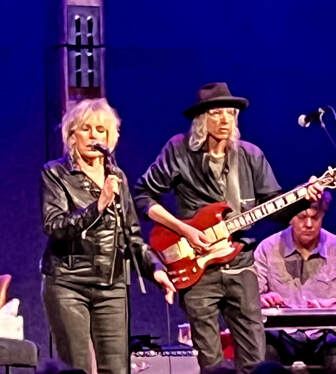|
Discussing the release of his first-ever album in The Guardian today, filmmaker Jim Jarmusch says, “Lately, I have an aversion to blues-based rock’n’roll guitar solos.” Jarmusch would have had a hard time at last night’s appearance of Lucinda Williams at City Winery, where a pair of gunslingers, one from Alaska, the other from Ventura, CA, shredded the necks of a half-dozen Guild and Fender guitars. It was a complicated, exciting, nostalgic, but perhaps irrelevant evening, during which I kept thinking, there’s a part of America that doesn’t exist anymore, or at least doesn’t matter, and it’s called America—that vast expanse between the east and west coasts, and especially the region south of DC—and that’s where Lucinda Williams and her band come from. Lake Charles and Baton Rouge, Nagodoches and Nashville, all these towns and cities Williams name-checks and criss-crosses in her songs, they’re all in some gravel road dream of the past that her songs evoke with fondness but expose as nightmare. So many meaningless deaths at the ends of meaningless lives. So much promise cut short by pills and pathologies. The men, especially the Scorpios, assholes, put on pedestals by the women who worship them.
I saw Williams at the Palladium in 1988. The self-titled lp that restored her career had just come out. She opened for Pylon (who seemed hopelessly, joylessly self-important) with two accompanists: fiddle and guitar. Saying nothing, she stared at the ceiling for forty anxious minutes and vanished. Last night, still clearly in recovery from a stroke, she stayed on for one hour and forty-five minutes. And she spoke. A lot. The band standing around looking at the stage floor. Nervously, I thought of the onstage ungluing of Barbara Jean in Robert Altman’s Nashville. But this was healthy banter, comfortable conversation, warm and almost fuzzy. She talked about some of the men in her life, especially the Scorpios, the ones she used to call beautiful losers but who’ve been upgraded to beautiful misfits ("Hard to lose, but harder to live with," was how she put it). She talked about her father. She talked about the stroke. She talked about where songs come from. Lucinda Williams is 70. Her audience is her age. A lot of big bellies, wide hips. A lot of men in baseball caps, several in cowboy hats. Gray hair, dyed hair, no hair, white hair. Her guitar player has white hair. She has white hair. And they all come from America, where they celebrate getting left behind together. A couple of other things: from as far back as I can remember, Jim Jarmusch had white hair. I still love blues-based guitar solos. I prefer sturdy, enduring songs. The Velvet Underground’s “Pale Blue Eyes” is one, and that was Williams’s first encore.
3 Comments
|
|

 RSS Feed
RSS Feed